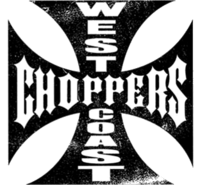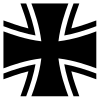
Jesse Gregory James is an American entrepreneur, automotive mechanic, and television personality. He is the founder of West Coast Choppers and former partner of Austin Speed Shop and current CEO of Jesse James Firearms Unlimited, both based in Austin, Texas. He was the focus of a show chronicling some of the custom motorcycle builds in his TV series Jesse James: Monster Garage, which ran a shortened single season in 2012 on the Discovery Channel before being canceled.

Orange County Choppers (OCC) was an American motorcycle manufacturer and lifestyle brand company based in the town of Newburgh, located in Orange County, New York, that was founded in 1999 by Paul Teutul Sr. The company was featured on American Chopper, a reality TV show that debuted in September 2002 on the Discovery Channel. The series moved to Discovery Channel's sister channel TLC in 2007. Following cancellation of the Discovery series, the company was also featured on Orange County Choppers on the CMT network in 2013. Orange County Choppers returned to Discovery Channel in March 2018.

A chopper is a type of custom motorcycle which emerged in the US state of California in the late 1950s. A chopper employs modified steering angles and lengthened forks for a stretched-out appearance. They can be built from an original motorcycle which is modified ("chopped") or built from scratch. Some of the characteristic features of choppers are long front ends with extended forks often coupled with an increased rake angle, hardtail frames, very tall "ape hanger" or very short "drag" handlebars, lengthened or stretched frames, and larger than stock front wheel. To be considered a chopper a motorcycle frame must be cut and welded at some point. I.e. the name chopper. The "sissy bar", a set of tubes that connect the rear fender with the frame, and which are often extended several feet high, is a signature feature on many choppers.

American Chopper is an American reality television series that airs on Discovery Channel, produced by Pilgrim Films & Television. The series centers on Paul Teutul Sr., and his son Paul Teutul Jr., who manufacture custom chopper-style motorcycles. Orange County Choppers is in Newburgh, New York. The contrasting work and creative styles of the father-and-son team and their resulting verbal arguments were the series' hallmark until 2008 when an explosive argument led to Paul Jr.'s termination and departure to start a competing chopper company, Paul Jr. Designs.

A custom motorcycle is a motorcycle with stylistic and/or structural changes to the 'standard' mass-produced machine offered by major manufacturers. Custom motorcycles might be unique, or built in limited quantities. While individual motorcyclists have altered the appearance of their machines since the first days of motorcycling, the first individualized motorcycles specifically labeled 'Custom' appeared in the late 1950s, around the same time as the term was applied to custom cars.
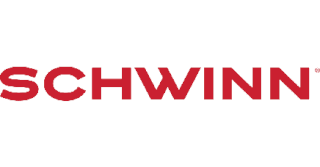
The Schwinn Bicycle Company is an American company that develops, manufactures and markets bicycles under the eponymous brand name. The company was originally founded by Ignaz Schwinn (1860–1948) in Chicago in 1895. It became the dominant manufacturer of American bicycles through most of the 20th century. Schwinn first declared bankruptcy in 1992, in 2001 Schwinn went bankrupt again and was purchased by Pacific Cycle, now owned by the Dutch conglomerate, Pon Holdings.

Paul Michael Teutul is one of the stars of the American reality television series American Chopper, also starring his father. Teutul was the chief designer and fabricator. Prior to this, he was head of the rail shop at Orange County Ironworks. He is the founder of Paul Jr. Designs, which manufactures custom motorcycles and sells branded clothing. Teutul, along with his father and younger brother Michael, became celebrities when they became the focus of a reality television series American Chopper on Discovery Channel in 2002.

Indian Larry was a motorcycle builder and artist, stunt rider, and biker. He first became known as Indian Larry in the 1980s when he was riding the streets of New York City on a chopped Indian motorcycle. Respected as an old school chopper builder, Larry sought greater acceptance of choppers being looked upon as an art form. He became interested in hot rods and motorcycles at an early age and was a fan of Von Dutch and Ed "Big Daddy" Roth, whom he would later meet in California.

David Mann was a California graphic artist whose paintings celebrated biker culture, and choppers. Called "the biker world's artist-in-residence," his images are ubiquitous in biker clubhouses and garages, on motorcycle gas tanks, tattoos, and on T-shirts and other memorabilia associated with biker culture. Choppers have been built based on the bikes first imagined in a David Mann painting.
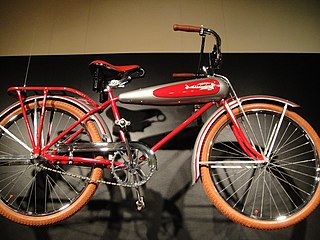
A cruiser bicycle, also known as a beach cruiser or (formerly) motobike, is a bicycle that usually combines balloon tires, an upright seating posture, a single-speed drivetrain, and straightforward steel construction with expressive styling. Cruisers are popular among casual bicyclists and vacationers because they are very stable and easy to ride, but their heavy weight and balloon tires tend to make them rather slow. Another common feature is their ability to be customized with accessories including fenders, lights and saddle bags. They are designed for use primarily on paved roads, low speeds/distances, and are included in the non-racing/non-touring class and heavyweight or middleweight styles of the road bicycle type.
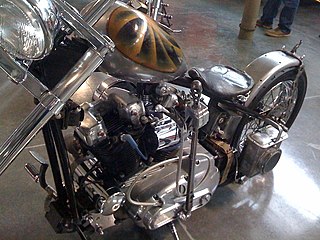
The terms suicide clutch, and suicide shifter or jockey shifter, refer to some motorcycles' foot-operated clutch and hand shifter to change gears. Foot clutches (rocker-clutches) and hand shifters (tank-shifts) were found on early motorcycle designs from around the turn of the 20th century to the 1940s or 50s, and reappearing on modern retro styled custom motorcycles and choppers. Modern motorcycles do not require removing a hand from the handlebars to shift gears, using only the fingers for the clutch and the toes of one foot to select gears. In contrast, the fanciful slang "suicide" was applied to designs where the rider removes one hand to change gears, or cannot put both feet on the ground while using a foot clutch to disengage the transmission. Sometimes the shifter is referred to as a "jockey shifter" while the foot clutch is called a "suicide clutch".

Nishiki is a brand name of bicycle, not a bicycle company.

A bobber, originally called a bob-job from the 1930s through 1990s, is a style of custom motorcycle. The typical construction includes removing the front fender, shortening the rear fender, which is "bobbed", and stripping excess bodywork as well as all superfluous parts to reduce weight.

The Honda Fury was the first production chopper from a major motorcycle manufacturer (Honda). In a break with tradition, the Fury was the first chopper to have an anti-lock braking system The Fury's styling has been likened to custom-made choppers from Paul Teutul Sr. or Arlen Ness. The Fury has been sold not only in North America, but internationally as well, although in some markets Honda eschewed the Fury name and offered the bike simply by its model ID: VT1300CX.
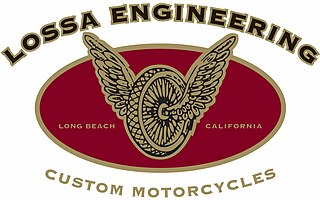
Lossa Engineering is a custom motorcycle manufacturer based in Long Beach, California. Founded in 2007 by Jay LaRossa, it specializes in café racers based on Japanese, Italian and British motorcycles from the 1960s and 1970s.

A wheelie bike, also called a dragster, muscle bike, high-riser, spyder bike or banana bike, is a type of stylized children's bicycle designed in the 1960s to resemble a chopper motorcycle and characterized by ape hanger handlebars, a banana seat with sissy bar, and small wheels. Notable examples include the Schwinn Sting-Ray and Krate lines and the Raleigh Chopper line. Other notable manufacturers and retailers that offered models include AMF, CCM, Columbia, Huffy, Iverson, J. C. Penney, Malvern Star, Monark, Murray, Ross, Sears, and Vindec.

Paul Jr. Designs (PJD) is a lifestyle brand motorcycle customizer and clothing vendor, based in Montgomery, New York, USA. Paul Teutul Jr. founded the design firm in 2009 after waiting out a one-year non-compete clause with his former company, Orange County Choppers (OCC).

Ron Simms is an American custom motorcycle builder, operating his business, Simms Custom Cycles, in Hayward, California. Simms has been building custom motorcycles for over 47 years. He has been featured in Easyriders magazine, and the photo essay book Art of the Chopper, where his work was compared to Arlen Ness as epitomizing the East Bay Style. In 2017 appeared in American M.C. Season 1 episode 1. Jesse James of West Coast Choppers apprenticed under Ron Simms.

Mike Seate is a motorcycle journalist, TV producer and presenter from Pittsburgh, Pennsylvania. In addition to newspaper columns, Seate has authored books and is the founder of Café Racer magazine.

Clifford A. "Sonny" Vaughs was an American civil rights activist, filmmaker, and motorcycle builder. Vaughs designed the two chopper motorcycles used for the 1969 film Easy Rider, while an associate producer on the film. He also produced and directed the documentary What Will the Harvest Be? (1965) and Not So Easy (1972).
